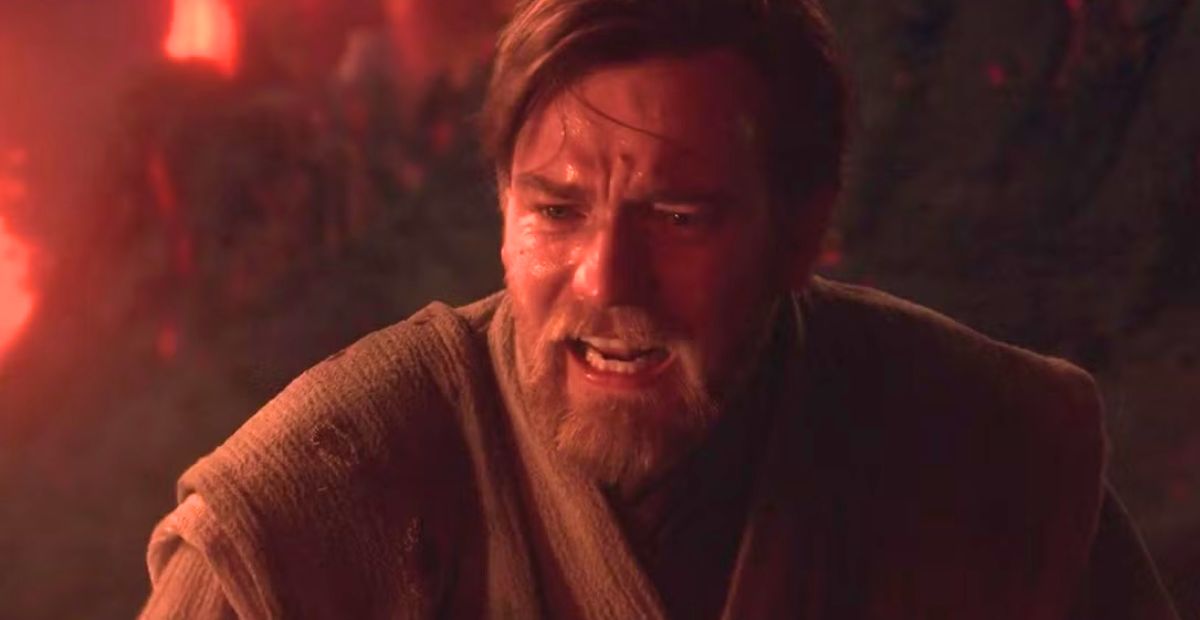We all know how the story ends. Obi-Wan stands over the burning remains of Anakin, broken by the cost of victory. It’s a moment burned into the minds of every Star Wars fan. But what the movie only shows on the surface, Matthew Stover’s Revenge of the Sith novel makes you feel. The clash on Mustafar isn’t just about lightsabers and lava, it’s about love, loss, and the shattering of two men who once called each other brother.
If the duel on screen broke your heart, Stover’s version will tear it wide open. The film gives us fire, fury, and betrayal—his novel digs into the soul of it all.
Obi-Wan Is Forced to Let Go of His Attachment
Before we reach the end of the scene, we need to look at how the novel reveals the deeper connection driving the fight between Obi-Wan and Anakin. The first thing worth noting is how Obi-Wan begins to confront his own attachment. Anakin wasn’t just his former Padawan—he was the brother Obi-Wan had chosen, the one he believed in more than anyone else.
Back to the duel on Mustafar: when Anakin drives Obi-Wan back onto the balcony and Obi-Wan makes that desperate leap onto a narrow conduit. On screen, it looks like another slick, “badass” Jedi move. But in Stover’s novel, we see something deeper—at that very moment, Obi-Wan realizes he still loves Anakin, despite everything.
As the book puts it:
“The man he faced was everything Obi-Wan had devoted his life to destroying: Murderer. Traitor. Fallen Jedi. Lord of the Sith. And here, and now, despite it all… Obi-Wan still loved him.”

However, that is Obi-Wan’s feeling. As a Jedi, his lessons from the other Masters always came back to him in moments before action. After admitting that he still loved his “brother,” Obi-Wan remembered Yoda’s teaching:
“Yoda had said it, flat-out: Allow such attachments to pass out of one’s life, a Jedi must, but Obi-Wan had never let himself understand. He had argued for Anakin, made excuses, covered for him again and again; all the while this attachment he denied even feeling had blinded him to the dark path his best friend walked.
Obi-Wan knew there was, in the end, only one answer for attachment…He let it go.”

After knowing this, the duel takes on a whole new weight when we rewatch the film. From the moment Obi-Wan and Anakin are battling on the conduit as everything collapses around them, it’s clear: Obi-Wan is no longer holding back. In his heart, he has already let go of Anakin. What stands before him now isn’t his brother, his apprentice, or his friend—it’s a Sith Lord, and Obi-Wan fights him as such.
And that’s exactly why, without hesitation, when Anakin makes his fateful leap over Obi-Wan’s head, he receives that brutal slice that ends the battle.
Obi-Wan’s Last Words to His Fallen Brother
Now we arrive at the final moment, when Anakin—already more Vader than Skywalker—lies broken on the black sand, his body catching fire as the lava roars around him. In the movie, Obi-Wan’s last words are unforgettable: “You were my brother, Anakin. I loved you.” Then, with unbearable grief, he turns and walks away.
But in Stover’s novel, this scene cuts even deeper. Obi-Wan’s words aren’t just about love—they carry the weight of shattered belief. He doesn’t only admit his bond with Anakin; he confesses his failure to save him from the darkness. As the book describes:
“You were the chosen one! It was said you would destroy the Sith, not join them. It was you who would bring balance to the Force, not leave it in darkness. You were my brother, Anakin. I loved you, but I could not save you.”

As Obi-Wan walks away, the novel reveals his true feelings in the aftermath of cutting down his brother. He isn’t drowning in grief anymore. Instead, he reflects on what it means to act as a Jedi. He knows that killing Anakin outright would have been a mercy—but he doesn’t feel merciful. What he feels instead is calm, clarity, and a painful acceptance of what must be.
As the book shows: “Obi-Wan looked down, It would be a mercy to kill him. He was not feeling merciful. He was feeling calm, and clear, and he knew that to climb down to that back beach might cost him more time than he had.”

This final passage changes everything we thought we knew about the duel. In the movie, we see Obi-Wan broken and grieving as he turns away. In the book, we see the harder truth: he doesn’t allow himself to grieve. He accepts the Jedi teaching, lets go of Anakin completely, and walks away with a clarity that feels even more tragic. Because deep down, Obi-Wan knows that the man he loved is already gone, and what’s left burning on the sand is only Darth Vader.
It’s this haunting mix of love, failure, and detachment that makes Matthew Stover’s Revenge of the Sith novelization so powerful.

